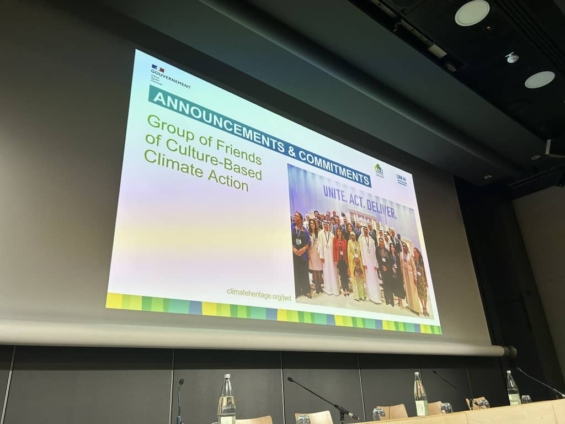Representatives from 70 countries adopted the Declaration of Chaillot at the inaugural Buildings and Climate Global Forum in Paris, France.
The Declaration de Chaillot is a critical step in the operationalisation of the Paris Agreement. For the first time, government officials have reached an agreement on a uniform declaration to include the whole sector's value chain in the transition.
"For the very first time, 70 governments from all continents commit to a concrete, operational roadmap with a monitoring mechanism to address the challenges of decarbonisation, resilience, and transition in the buildings and climate sector,” said Mr Christophe Béchu, France’s Minister of Ecological Transition and Territorial Cohesion.
Mr Béchu stated that they, along with all stakeholders in the value chain, have promised to develop frameworks, mobilise funds, and share solutions from around the world to execute the Paris Agreement in a sector that contributes for 21% of greenhouse gas emissions and 55% of global income. This is a pivotal time in diplomacy and climate action.
The fundamental agreement for international collaboration, organized by the French government and the UN Environment Programme (UNEP), will pave the way for a swift, fair, and effective transition of the sector.
Over 1,400 people attended the Forum, which focused on building decarbonisation and climate resilience.
According to the latest Global Status Report for Buildings and Construction, published this week by UNEP and the Global Alliance for Buildings and Construction (GlobalABC), the building and construction sector accounts for more than one-fifth of worldwide greenhouse gas emissions.
According to the analysis, in 2022, the sector accounted for 37% of global operational energy and process-related CO2 emissions. In the Declaration de Chaillot, the signing ministers emphasise that as climate change accelerates, buildings will become more vulnerable to climate-related concerns, particularly in developing countries and cities.
It also indicates that, by 2050, 68% of the world's population will reside in cities, and global raw material demand is predicted to quadruple by 2060.
The signatories to the Declaration de Chaillot note the continued inadequate volume of restorations and construction of sustainable buildings, expanding the gap between the sector's trajectory and the Paris Agreement's target of keeping global warming below 1.5°C by 2100.
They also oppose further investment in carbon-intensive systems and buildings, as well as the over-exploitation of natural resources for construction material manufacturing, both of which contribute to biodiversity loss and environmental deterioration.
It also touched on climate emergency, a rapid transition of the building industry which is a direct prerequisite for meeting the targets set by the Paris Agreement. It looked the importance of building this transition with all stakeholders, using a shared vision of collaboration and coordination while taking into account the unique characteristics of each state.

Ligia Noronha, UN Assistant Secretary-General and Head of UNEP's New York Office, stated that the Declaration de Chaillot will increase cooperation and strengthen the implementation of local, national, and international climate action in the building and construction sectors to support the Paris Agreement's goals.
“The next round of National Determined Contributions (NDCs), to be submitted by early 2025, will offer a great opportunity to move from ambition to action and accelerate the transformation we need,” he said.
Brazil's Minister of Cities, Jader Barbalho Filho, expressed the country's support for the Declaration of Chaillot, saying that while the commitments listed in this important Declaration are beyond the scope of the Ministry of Cities, “we are committed” to doing our part and supporting the Brazilian government in whatever way we can to ensure that they are met.
“To go further, we are examining the possibility of holding a ministerial meeting during COP-30 to continue the discussions initiated in this Forum. And finally, we would like to announce that we will be suggesting and supporting a specific working Group to address the decarbonization of the buildings and real estate sector within the G20 framework."
The ministers committed to implementing roadmaps, regulatory frameworks, and mandatory building and energy codes to move towards carbon-neutral buildings. They will also implement a financial framework with incentives to increase the share of resilient, near-zero emission, and affordable buildings, as well as promote the adoption of labels, standards, and certifications. They will also set an example by adopting ambitious policies.
Other commitments made include multi-level governance, stakeholder coordination, and a more participatory approach to assure implementation coordination, as well as the development of tools and regulatory frameworks to gather and exchange data and best practices.
To guarantee that these promises are met, the ministers pledge to use all international platforms, including the G7, G20, G77, and climate COPs, to further embrace construction and building-related concerns. They announce the formation of a "Intergovernmental Council for Buildings and Climate" coordinated by the GlobalABC to support and monitor the Declaration's goals and methods of implementation.
Latest Stories
-
EC reschedules nomination for Nkoranza North and South District Level Elections
4 minutes -
Energy Minister must recover stolen ECG containers or be held accountable – Ntim Fordjour
20 minutes -
CLOGSAG suspends strike over Births and Deaths Registry appointment
40 minutes -
Ing. Ludwig Annang Hesse is new president of GhIE
49 minutes -
One artiste can’t take Ghana to the top, we must collaborate – Edem
50 minutes -
Presidency hasn’t ordered NIB to investigate Akufo-Addo’s travels – Felix Kwakye Ofosu
52 minutes -
Edem explains how 2023 motor accident made him lose gigs
1 hour -
Smoke detectors and modern technology: A game-changer in Ghana’s fight against market and home fires?
1 hour -
Provisional results for 2025 WASSCE First Series released
1 hour -
50 female entrepreneurs graduate from Access Bank Ghana’s Womenpreneur Pitch-A-Ton
1 hour -
Araba Sekum to represent Ghana at Queen of the World pageant in USA
1 hour -
Remembering Shirley Graham Du Bois: A woman who called Ghana ‘home’
1 hour -
TVET is not just acquiring certificate, but rather empowering individuals with practical skills – McDan
2 hours -
A century in the sky: Delta celebrates 100 Years with museum refresh
2 hours -
Stakeholders call for amendment of Persons with Disability Act
3 hours

